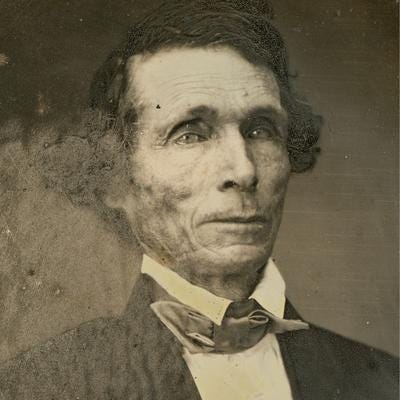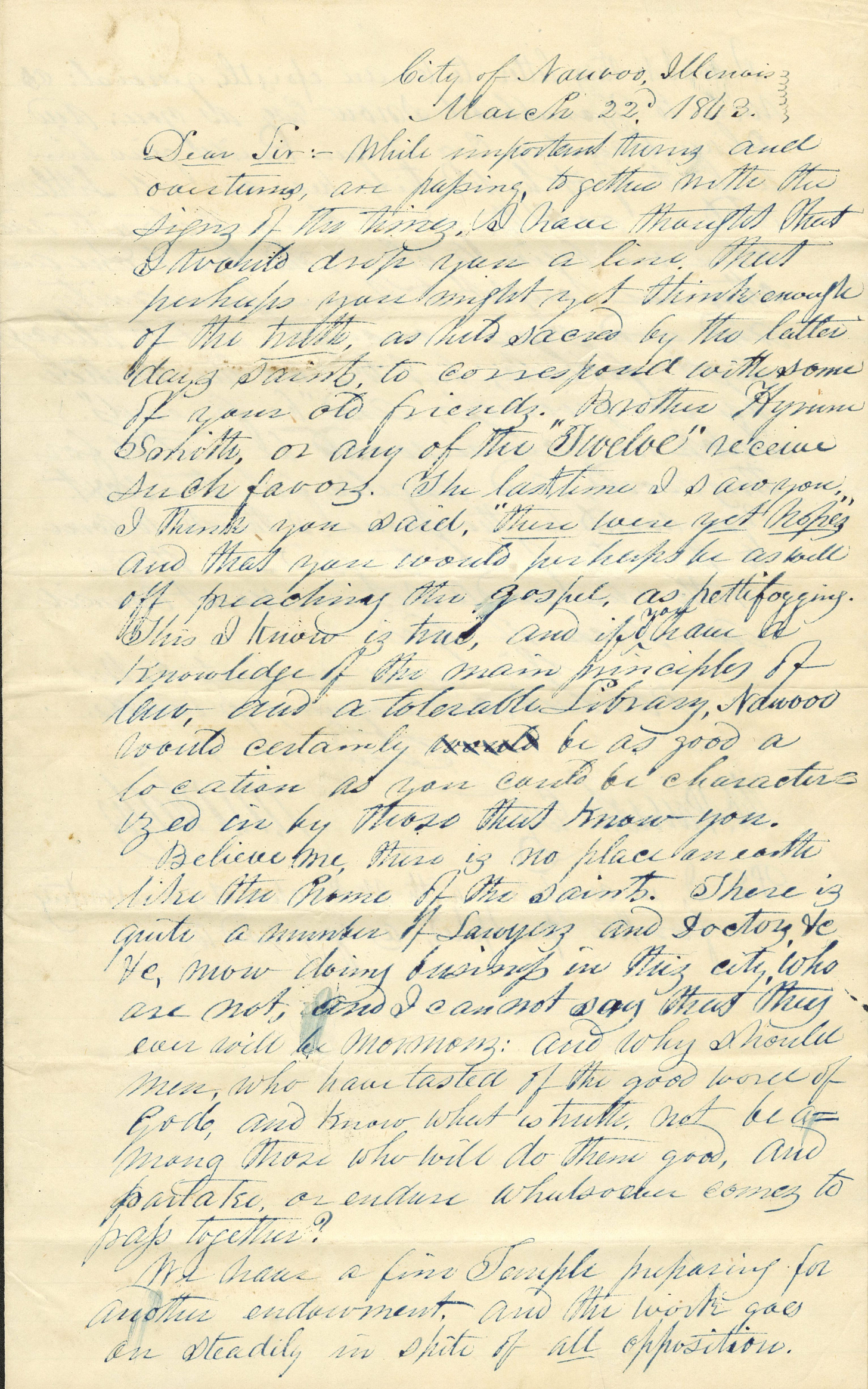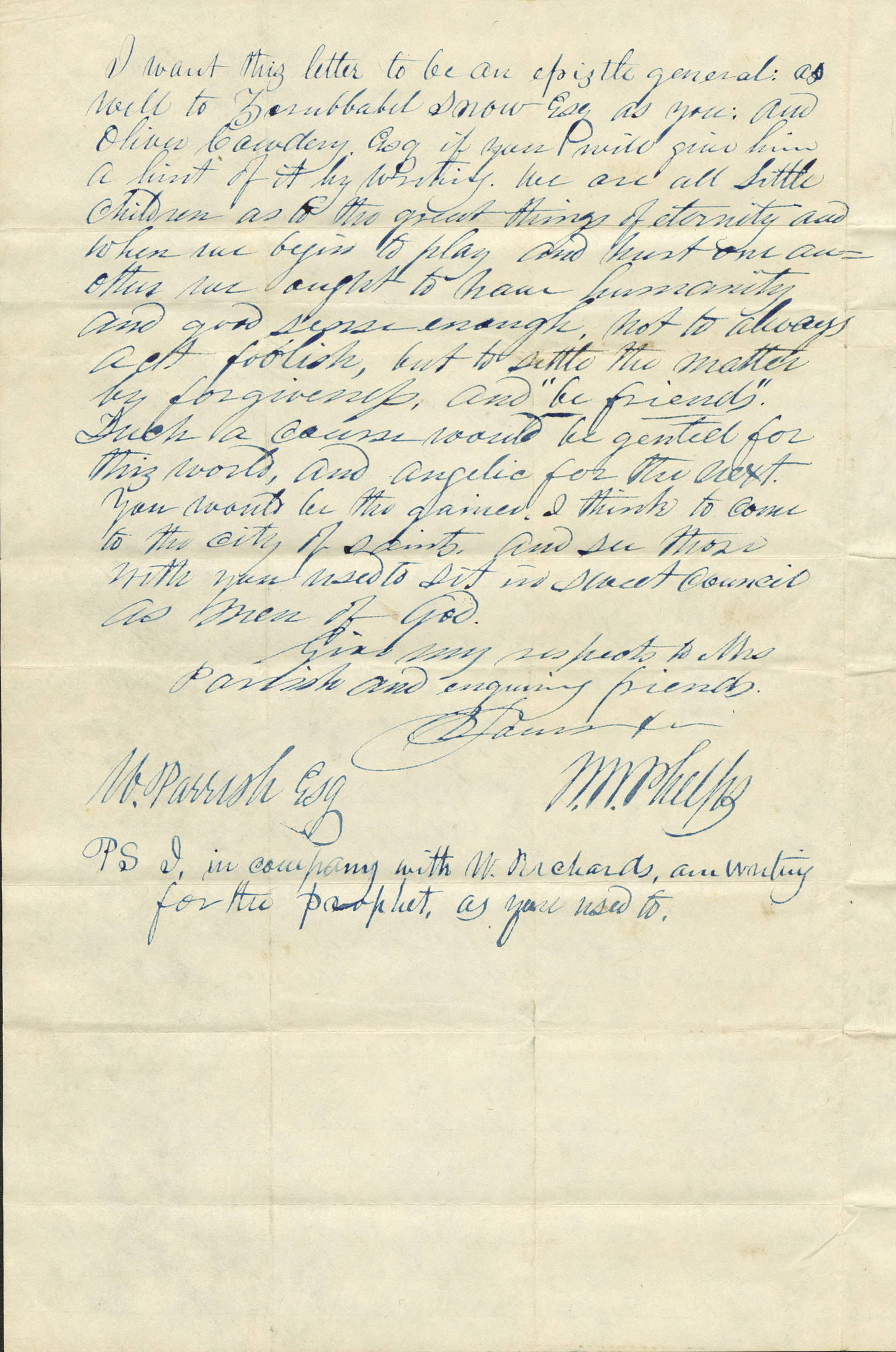"We are all little children as to the great things of eternity"
W. W. Phelp's 1843 letter to Warren Parrish
William Wine Phelps, a noted Latter-day Saint composer, had a complicated and sometimes strained relationship with The Church of Jesus Christ of Latter-day Saints. Born in New Jersey in the late eighteenth century he was an early convert and leader. Despite being excommunicated three times he was re-admitted after each episode and he died in full fellowship with the Church.1
In March 1843 he was working for Joseph Smith, the church’s founder, as a scribe. He had been excommunicated twice (once in 1838 and again in 1839), but in June 1840 he was rebaptised and sent on a mission to the Eastern United States the following year.
In November 1842, Phelps moved to Nauvoo where he assisted Joseph Smith in publication efforts. Over the next few months, he worked with Willard Richards to write Joseph Smith’s history and was given responsibilities in the town. In March 1843, Phelps wrote a letter to Warren Parrish, another early Latter-day Saint convert and leader who had been excommunicated from the Church for embezzlement and counterfeiting in December 1837.
It is currently unclear how the Church came back into possession of the letter. There is no postmark. It could be that it was not posted, that it was hand delivered and either returned or refused, or in some other manner. It would be a shame to think that this letter written in a nostalgic and brotherly tone could have been the catalyst for a change of heart for Warren, but by this point he was associated with Baptists. Perhaps the pain of his excommunication and ousting might have been too hard to overcome in any case.
William and Warren knew each other and had served together in the earliest years of the fledgling Church. By 1843 Warren was living in Massillon, Ohio, after his band of dissenters dissipated. Records show that by 1844 he was living in the Fox River area of Wisconsin and Illinois where he was working as a Baptist minister.
Despite William Phelp’s tumultuous relationship with the Church he reached out with love to Warren and his other acquaintances, including Zerubbabel Snow and Oliver Cowdery who had also left the Church. Phelps makes an appeal to Parrish’s earlier memories and experiences with the Saints. Old acquaintances are projected as being willing to correspond with Parrish and that he would be ideally suited for life in Nauvoo. Phelps also shares news of a temple and indicates that things are progressing for the Saints.
The below letter serves as a tender example of Latter-day Saints reaching out to former members and that no one should be forgotten.2 Phelps makes an appeal to Parrish to forgive and build bridges again when he says:
We are all little children as to the great things of eternity and when we begin to play and hurt one another we ought to have humanity and good sense enough, not to always get foolish, but to settle the matter by forgiveness, and “be friends”.
Appeals to memory can have a powerful impact, but sadly the letter and its underlying intention seem to have had no effect on Parrish and he remained apart from the Church that he had worked so hard for in years gone by. Whereas extending the hand of fellowship to a former member can work, there are other times that it does not and such was the case with Warren Parrish.
In later years Warren Parrish lived in different places working in Baptist congregations but by 1870 he was listed in the census as being “insane” and he died in 1877 in Emporia, Kansas.3
City of Nauvoo, Illinois
March 22, 1843
Dear Sir:- While important things and our turns, are passing, together with the signs of the times, I have thought that I would drop you a line. But perhaps you might yet think enough of the truth, as held sacred by the Latter day Saints, to correspond with some of your old friends. Brother Hyrum Smith, or any of the “Twelve” receive such favors. The last time I saw you I think you said, “there were yet hopes” and that you would perhaps be as well off preaching the gospel, as pettifogging. This I know is true, and if you have a knowledge of the main principles of law, and a tolerable library, Nauvoo would certainly be as good a location as you could be characterized in by those that know you. Believe me, there is no place on earth like the home of the Saints. There is quite a number of lawyers and doctors + etc, now doing business in this city who are not, and I cannot say that they ever will be Mormon: and why should men, who have tasted of the good word of God, and know what is truth, not be among those who will do them good, and partake, or endure whatsoever comes to pass together?
We have a fine temple preparing for another endowment and the work goes on steadily in spite of all opposition. [End of page 1]
I want this letter to be an epistle general: as well to Zerubbabel Snow Esq as you: and Oliver Cowdery, Esq if you will give him a hint of it by writing. We are all little children as to the great things of eternity and when we begin to play and hurt one another we ought to have humanity and good sense enough, not to always get foolish, but to settle the matter by forgiveness, and “be friends”. Such a cause would be genteel for this world, and angelic for the next. You would be the gainer, I think to come to the city of Saints, and see those with you used to sit in sweet Council; as men of God.
Give my respects to Mrs Parrish and enquiring friends.
Yours
W. W. Phelps
PS I, in company with W. Richards, am writing for the prophet, as you used to. [End of page 2]
Biographical materials for Warren Parrish and William Wines Phelps are from the Joseph Smith Papers project. Warren: https://www.josephsmithpapers.org/person/warren-farr-parrish. Phelps: https://www.josephsmithpapers.org/person/william-wines-phelps.
Letter from W. W. Phelps to Warren Parrish, 22 March 1843, MS 15536, bx. 1, fd. 1, CHL.
"United States Census, 1870", database with images, FamilySearch (https://www.familysearch.org/ark:/61903/1:1:MCJ5-GH9 : 28 May 2021), W F Parish, 1870.




